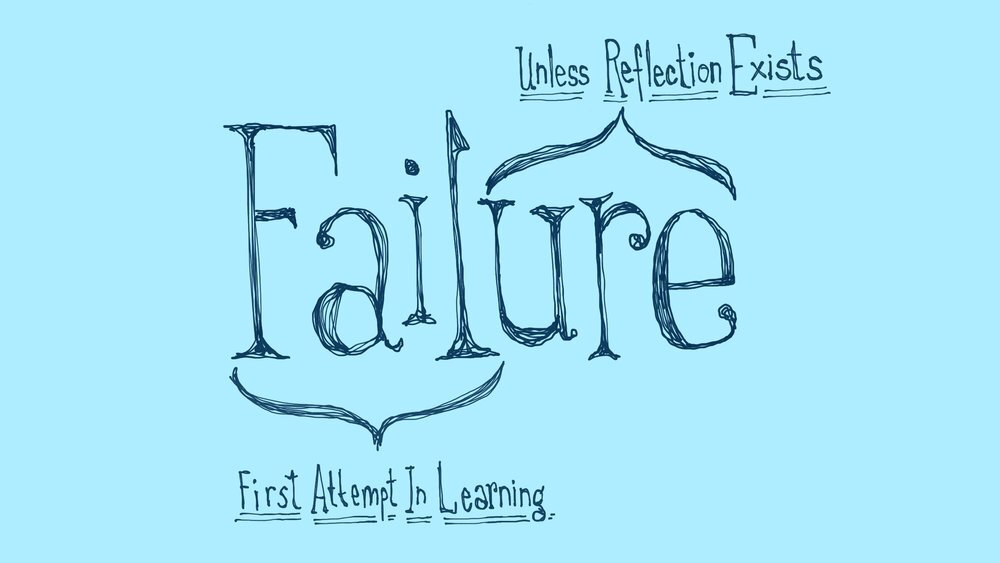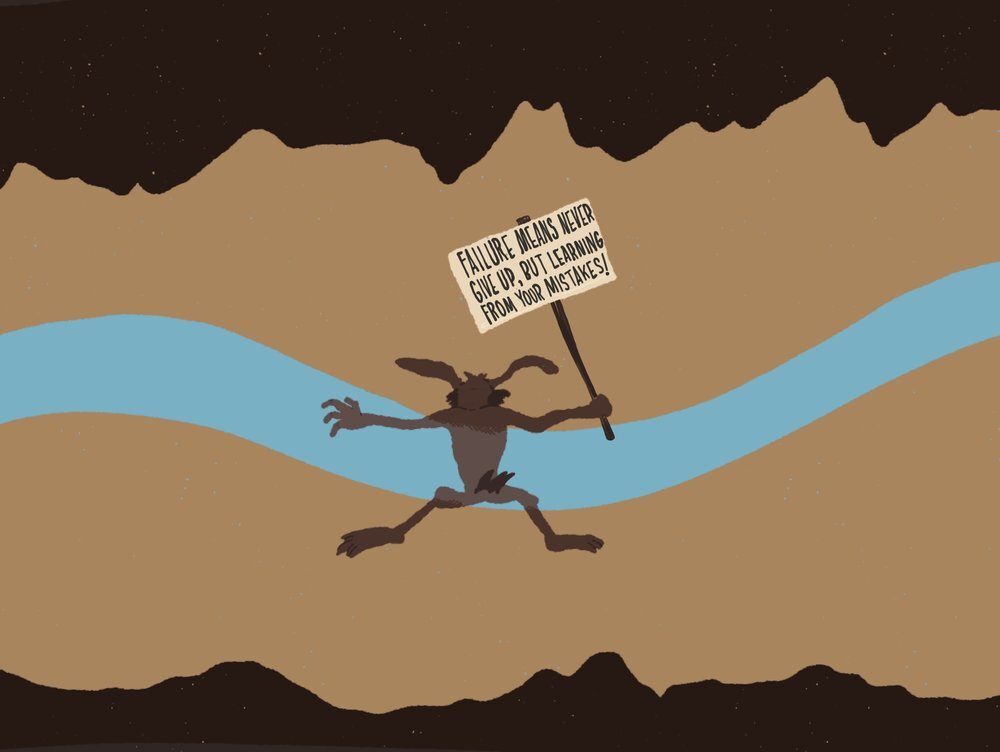Why Education Needs To Understand That Failure Is A Process Not A Destination

There is a movement in education that promotes and even glorifies failure. Graphics proclaiming that we should fail forward, fail ofen, and of course view F.A.I.L as a First Attempt In Learning. I too am I proponent of failure, and believe that is has been a key ingredient not just in my own success, but for so many successful people I look to for inspiration and guidance. Recently Tim Ferris, a famous entreprenuer and author of "The 4 hour work week", reflected on 200 episodes of his podcast. He shared that upon reflecting on those episodes he realized that the ability to not just embrace failure, but learn from it was the common thread with so many of his guests. Check out that episode here. This episode, and a number of podcast episodes produced by Gary Vaynerchuk talk about more than just embracing failure, but what you do the moments after you fail. In education, we have introduced failure to the learning process, and even in small circles began to present failure as a positive experience. The question is what are we doing after that?
How are we teaching students to reflect on their failures, identify mistakes, and actually achieve a greater success in act or product than the first attempt?
How are we teaching kids to be reflective on their actions, decisions, and behaviors? How are we giving them the tools to do something with failure?
Without Reflection, Failure Is Guaranteed
Failure isn't a destination, it's a process. No one actually wants to fail. Yet failure is inevitable if you are doing something worth doing, something outside of your comfort zone, something amazing. It will happen if you are pushing yourself, and if you have the right mindset, you can learn wonders from experiences that have been deemed a "total fail". What is required is reflection, and without it, I find it to be potentially devastating to promote failure in a learning environment that is still dominated by standardization and predetermined outcomes.
A friend of mine, a graduate of a top 10 university told me that the first time out of college that he failed completely shattered him. He had mastered school, sailing through with nothing short of a 3.8 GPA, high SAT score, and a truck load of extra curricular activities. Yet in the real world where life is not pre defined with a four letter choices, it can be an absolute shock to not get an "A".
Our educational system has become so hyper obsessed with proficiency as the gold standard, that no matter how experimental the learning becomes, or how valuable failure is seen, it is still an isolated experience. Even those experiences, where failure is "built in", it sometimes feel so planned out that it is as if we are looking for students to become proficient in failure. When you shift the discussion and analysis of failure to outside of education, failure is not an experience, a first attempt, it is part of the process of reaching long term success. In the short term it is easy to create safe experiences with clearly defined outcomes, such as fill in the blank or the answer as D, but challenges that require non linear thinking and complex problem solving cannot be nurtured and developed in the land of multiple choice.

In the world of business, especially in Startup culture, failing is not an intended outcome, it's almost a way of life. It is the result of taking risks and going beyond what is viewed as possible and achievable, but it must be do No worksheet, quiz, or cookie cutter group project is possible here because the end goal is something bigger than that, its inception complex, multi faceted, and difficult to define. As a result of this level of challenge it is not just failing, it is F.A.I.L.U.R.E. because that first attempt will lead to subsequent attempts Unless Reflection Exists.

Now I assume that if you have read thus far, you are open to embracing failure. It is another thing altogether to act on it and risk providing such learning experience. Especially when at the end of the day school is still is dominated by a letter grade, and anything below a C (aka average) is considered as if it is an F. School has defined average, but has created a culture where the standard is above average and excellent, levels achieved by mastering the art of memorization and test taking. This proficiency based approach does not assess mastery, growth, or anything big picture. It is a simple snapshot of what can be regurgitated right now through memorization, and what to say and when to say it. In the real world, this level of performance will get you very little, and at the advancement rate of technology, the jobs that do require such skills may just be obsolete by 2020.
When I ask friends and collages, like the one earlier who went through the system, gamed it, and finished on top, they feel uncomfortable with failure. Has our education system created a false reality? Has it made us unable to fail in a world where failure is inevitable? My own school experience conditioned me to believe that my failures represented who I was. My lack of success in engaging with the standardized method of learning defined me. Einstein famously said that,
“Everybody is a genius. But if you judge a fish by its ability to climb a tree it will life its whole life believing that it is stupid”.

Where was this quote when I was 8, 15, or 19?
For education to truly understand failure, its role in greater gains and success, we must look outside of education. We need to look at businesses, tech companies, and entrepreneurs that don't take the uncharted road, but the road that didnt exist yet. Through that lens, we can equip students with the confidence and awareness to anaylize and achieve more through failure. It allows a conversation to develop around the idea that challenge and complex experiences can and may result in failure, because a more significant outcome is possible. This is what makes failure an ingredient for success. Like most things in life, nothing significant is achieved on the first try. True innovation, and the creative capacities required to achieve it require failure to be part of an effective and thoughtful process, a stepping stone towards success. It is in this realm that failure can give support space that allows your inspiration and imagination to thrive and result in creative ways to solve problems. What failure is not in any capacity is an excuse for poor time management, disorganization, or lack of effort and determination. That is why embracing failure can be a danger zone and it is up to us as educators and mentors to help our students learn the difference.
Innovation Is Not A First Try Experience
Nothing of true value is accomplished on the first try. This holds true to most of life's experiences from learning to walk, tying your own shoe, riding a bicycle, to launching a startup, rising the ranks of corporate America, or inventing the next life changing product. The problem lies in between these two phases of life where we are expected to spend 12-14 years getting it right on the first try. And if you don't? You fail, and not the good kind we are talking about here. The problem is that it is a performance failure, not a growth failure. There is no space to reflect, redo, and revolutionize the failed process. Then we leave the fantasy world of perfect scores and extra credit. It is here that students fear failure, and avoid it at all costs, unless its a video game of course, then failing is great because you can always save the game, die 300 times, and keep at it. Even as an artist and designer this first try perfection mentality was been ingrained in me. It has taken years to purge myself of this falacy, and I believe I am better off for it. So what is it about this first try mentality, and why is it nearly impossible to innovative on the first try? For school to truly embrace failure it needs to instill in students to never give up, but learn from their mistakes. Challenges that requires risk and multiple attempts can be proud experiences for learners, but they need to be thoughtful. We can't be like the coyote who foolishly chases the roadrunner without reflecting and analyzing the flaw in his plans.

Remember, the reason innovation cannot happen on the first try is because innovation is not an act it is a process. True innovation requires you to develop a solution or product that creates value for others. The best solutions need to be reviewed, revised, and reflected upon with the expectation that the first iteration may fail, and most certainly not be the best. Now try to fit that approach into our current educational system. Imagine if learning in our schools started with a teacher saying “I don’t know...” or “I wonder…”. Instead teachers are forced to engage in scripted out indoctrinated experiences where the biggest fear for a teacher is being exposed as anything but a master expert of classroom content. While a complete overhaul of our educational system might not be possible via your classroom, there is room for you to introduce and nurture the concept of failure as a form of the ideation, implement, reflection, relaunching of learning. Whether or not you consider Edison as the sole inventor of the lightbulb, to understand what true innovation looks like you must understand that
Edison was not trying to invent the lightbulb. He was trying to invent the ability for the world to see in the dark.

It is that end goal of positively impacting those around us that fueled him to fail thousands times as he worked towards creating a safe and sustainable light source. The failure, the understanding that first does not mean best, and the willingness to review, redo, and even throw it out to start a new, will not just result in better production from students, it will embolden and empower them. Sort of like that game they are willing to play a level 300 times just to prove they can win.
In education, the embracing of failure has a long way to go. For it to really become part of school culture and influence change, educators, and more importantly administrators need to see the value of failure. If failure is still overshadowed by test scores, then education will continue on with its 20th century model. One where failure is a novelty, a classroom light in a sea of educational darkness. It doesn't have to be that way. For now we need to keep on pushing the boundaries of what education should really look like to help today's kids. We need to keep on fighting the good fight.
